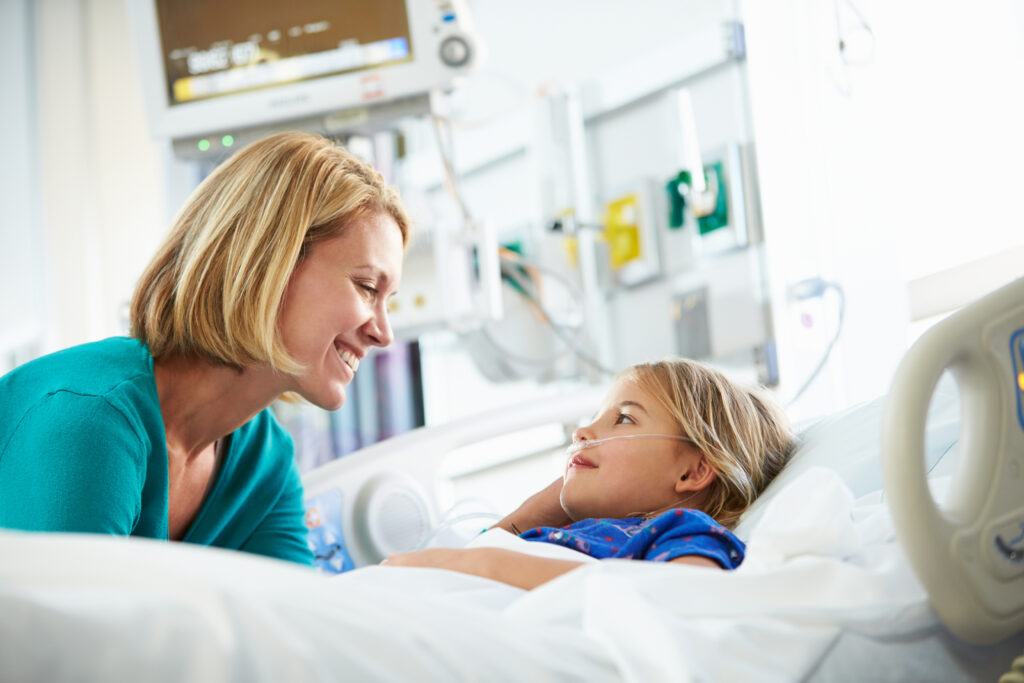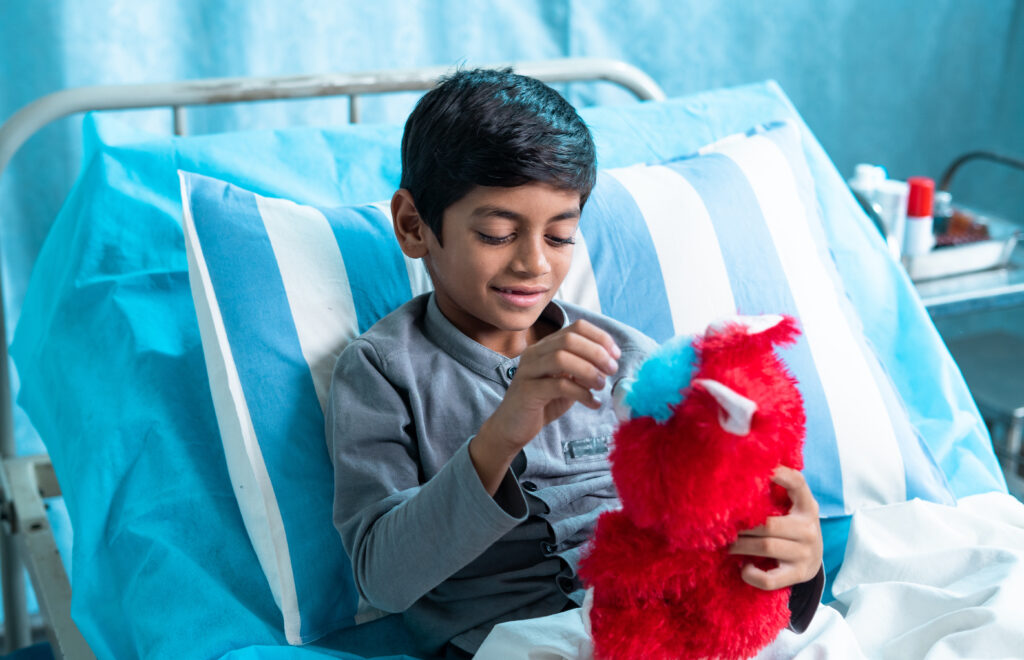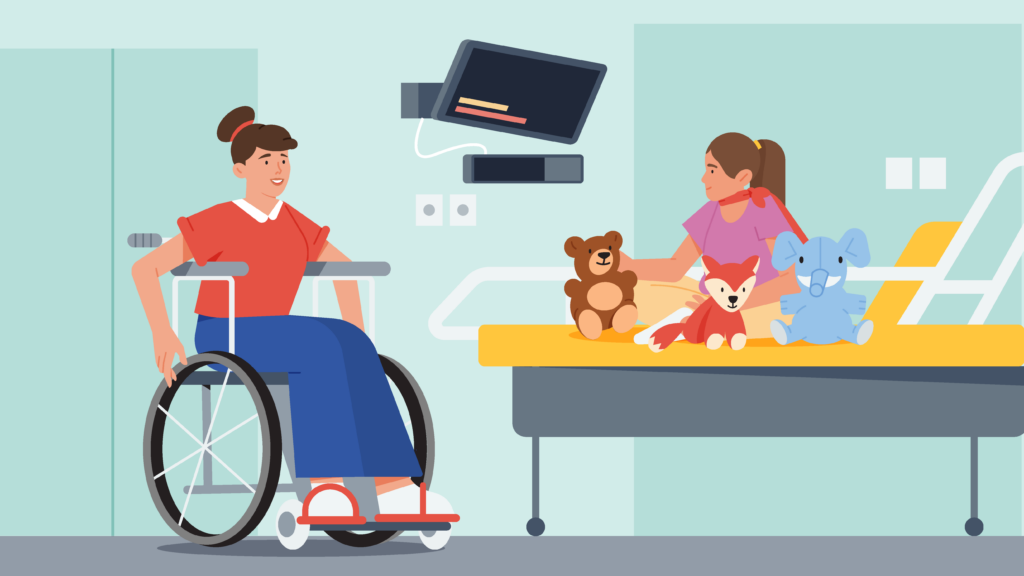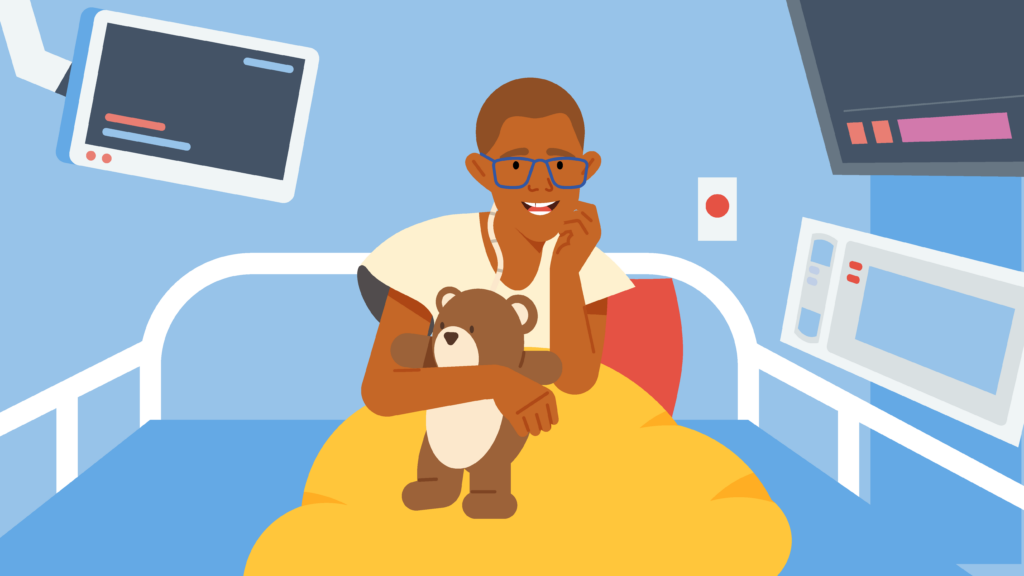Stories of the present and future
Eva’s story
Background
Eva is an 11-year-old girl who lives with her parents in Hastings, East Sussex. She has acute myeloid leukaemia. Her specialist cancer care is led by the Royal Marsden NHS Foundation Trust.
Eva is having her first cycle of chemotherapy treatment at The Royal Marsden.
A few days ago, she caught a virus. Despite taking extra antiviral medication, Eva developed fevers and a dry cough.
Yesterday morning she was getting very tired from the increased effort she was making to breathe. The level of oxygen in her blood dropped and her heart rate increased. To help with her breathing, Eva needed oxygen via a face mask.

Now
The paediatric team at The Royal Marsden follows strict guidelines when children have breathing problems. If a child may need intensive care treatment, conversations with other professionals start at an early stage. Staff call the South Thames Retrieval Service (STRS) to transfer the child to St George’s Hospital in a specially equipped children’s ambulance.
Eva was transferred to St George’s children’s intensive care unit.
Every day, a children’s consultant from The Royal Marsden attends St George’s Hospital to look after children with cancer and share their expertise with the teams treating children with cancer.
Today, the haematology consultant (who treats blood cancers) is giving guidance to the intensive care team about some of the specialist medication Eva needs. This will reduce her chances of having other complications from her treatment.
The consultant is delighted to hear that Eva’s condition has improved. She is now stable without requiring oxygen. Her temperature has settled, and her heart is beating at a normal rate and rhythm for her age.
The children’s intensive care team suggests Eva may be able to return to The Royal Marsden in a day or two. Eva will go on to have three more cycles of chemotherapy at The Royal Marsden. After each of them, she will go home. If, when all her chemotherapy treatment is finished, Eva needs a bone marrow transplant, she will have it at The Royal Marsden.
In the future
At the future Principal Treatment Centre, children’s cancer services currently at The Royal Marsden would be on the same as site as children’s intensive care.
Staff from the children’s intensive care unit would be able to support the medical and nursing team looking after Eva on the cancer ward. This might mean she would not need to go to the children’s intensive care unit.
If her symptoms got worse and she did need intensive care, there would be no journey by ambulance to another hospital: she would simply be moved to the intensive care unit nearby. Cancer specialists would be able to visit Eva regularly to monitor her progress and advise the intensive care team throughout her time in intensive care.
Eva would go on to have the rest of her chemotherapy at the future Principal Treatment Centre. If, when all her chemotherapy treatment was finished, Eva needed a bone marrow transplant, she would have it at the same hospital.
Wherever she was in the hospital, the key members of staff involved in her treatment and the same team of play specialists and teachers would all continue to see Eva regularly.
Ravi’s story
Background
Ravi is an eight-year-old boy who has a tumour in one of his kidneys. He lives with his mother and little sister in Ramsgate, east Kent.
When Ravi was first diagnosed, he had an operation at St George’s Hospital in Tooting to insert a portacath (a device used to take blood and give treatments).
Then he had chemotherapy for four weeks at The Royal Marsden NHS Foundation Trust in Sutton.
He has recently had a second operation at St George’s where specialist children’s surgeons removed the cancer from his kidney.
He, his mum and sister travel to the hospitals by hospital transport. It takes at least an hour and a half to get to Sutton and around two hours to reach Tooting.

Now
Ravi needs a further 12 courses of chemotherapy. This will mean three days of chemotherapy treatment at The Royal Marsden, every three weeks, for 34 weeks. There are flats for patients and families nearby where he and his family can stay if needed.
Chemotherapy can affect fertility. Ravi’s consultant has suggested he has an operation at St George’s in case he wants to have children in the future. This will be before he starts chemotherapy.
Because Ravi is so young there may be long term effects of treatment. So he will also need regular hearing assessments, kidney function tests, and echocardiograms (a scan to look at the heart and surrounding blood vessels) to check for any changes.
The kidney tests and echocardiograms will be at The Royal Marsden. The hearing assessments will be at a special centre.
This will mean Ravi and his family travelling to up to two different hospitals and the hearing centre before he starts chemotherapy and at specific points during his treatment.
A clinical nurse specialist at The Royal Marsden will make the appointments, help with the arrangements and offer expert support and care to Ravi and his family. But travelling to different sites can be a stressful experience for families.
In the future
At the future Principal Treatment Centre, very specialist cancer treatment services for children would be on the same site as children’s cancer surgery and most other specialist services that children with cancer need.
Ravi’s surgeries and treatments would be in one place that he already knows, which would reduce distress for Ravi and his family and improve their experience.
He would go to a different site if he needs radiotherapy. One in three children with his condition do.
It would take Ravi and his family about two hours to get to either of the two possible options for the future centre by road. Both options would also provide family accommodation, if needed.
These are examples – not the stories of actual patients.

